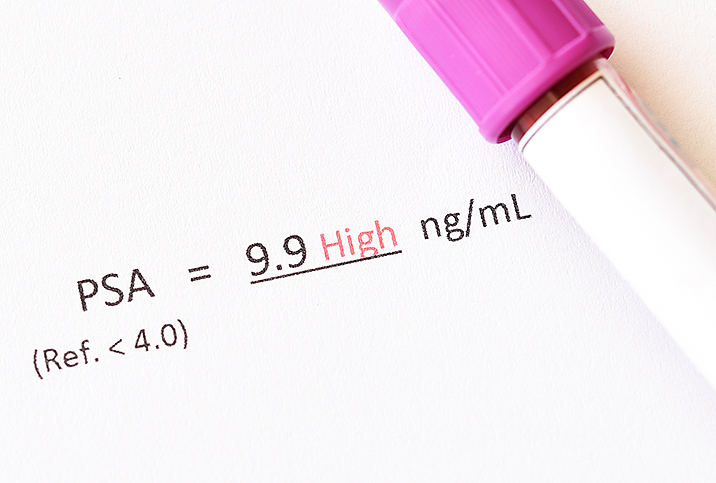An Elevated PSA Level Is Cause for Conversation, Not Panic

A prostate-specific antigen test, also known as a PSA test, is a type of screening for prostate cancer. However, the efficacy of the test has been the source of heated debate, with critics stating that its inaccuracies can stir panic in male patients. While this test may show that a man has prostate cancer, a positive test shouldn't necessarily be a cause for alarm. Find out why the results should be more about conversation and less about consternation.
What are a PSA test and elevated PSA level?
Approved by the U.S. Food and Drug Administration in 1986, a PSA test measures the level of prostate-specific antigen in the blood. PSA is a protein made by both normal and cancer cells in the prostate gland. It's mostly found in semen, but a small amount is also found in the blood. Men with high levels of PSA in their blood have been shown to have early-stage prostate cancer, although this isn't a foregone conclusion. Typically, the test is used in conjunction with a digital rectal exam (DRE), giving doctors two sources to construct the proper diagnosis.
Should I have a PSA test?
Whether you should have a PSA test is almost entirely dependent on age. The American Urological Association (AUA) has outlined when or if a man should undergo a PSA screening:
- Younger than age 40: PSA tests are not recommended, in part, because there is no evidence showing any benefit of screening.
- Ages 40 to 54: Routine screening is not recommended for men at average risk, although Black men and those with a family history of prostate or certain other cancers should make individual decisions about being screened.
- Ages 55 to 69: The greatest benefit of PSA screening exists in this age group, simply because these men are more prone to developing prostate cancer. Individuals should weigh the benefits and harms of screening and talk with their doctor to make a shared decision. An interval of two years or more between screenings may be recommended.
- Ages 70 and older: The AUA doesn't recommend PSA screening in men with a life expectancy of less than 10 to 15 years, although men in excellent health may benefit from screening.
Keep in mind that these are merely guidelines. If you notice any symptoms or warning signs of prostate cancer, consult your physician and ask about whether a PSA test is necessary.
Why PSA tests can be inaccurate
Although PSA tests can help detect early-stage prostate cancer in asymptomatic individuals, the results are often inconclusive. Up to 80 percent of men with elevated levels of PSA don't have prostate cancer, according to a Harvard Medical School report. A high PSA level is often the result of prostatitis or natural enlargement of the prostate due to age.
Such false positives have caused men to undergo unnecessary cancer treatment that has had long-lasting effects, including problems with erectile dysfunction (ED) and infertility. Conversely, PSA tests don't detect all cases of cancers, so false negatives have caused many men to suffer or die from prostate cancer.
Despite these gray areas, medical professionals continue to use the test but consider other factors—primarily age—when evaluating the results.
What to expect after an elevated PSA test
Don't freak out if you have an elevated PSA level in your bloodstream. If you're asymptomatic for prostate cancer, this level doesn't necessarily point to a dire diagnosis. In most cases, a doctor will discuss what to do next. Such a conversation often points to additional PSA testing and a digital rectal exam to search for suspicious lumps in the prostate. Your doctor may also suggest X-rays, cystoscopy and transrectal ultrasounds to further investigate the issue.
If you have any conditions that may indicate a diagnosis of prostate cancer, your doctor will take a biopsy and send it to a lab for testing. Until you get the results, remain calm. It could be nothing.
Conversation is imperative
Just because you have high levels of PSA, you shouldn't let the situation overwhelm you. Talking with your doctor about the potential of prostate cancer, as well as other issues of the prostate, should remain your first action. Several other screening options may be available, so consult your doctor to find the best avenue for your comfort and peace of mind.
Support for prostate cancer patients
If you've shown high levels of PSA and are concerned about prostate cancer due to a family history of cancer, don't suffer in silence. Support groups, both online and in person, as well as the Prostate Cancer Helpline (1-800-808-7866) can offer the foundation you need to overcome the fear, uncertainty and doubt that accompany a diagnosis. Through these resources and the support of loved ones, prostate cancer can be just another hurdle that you're bound to leap over.


















